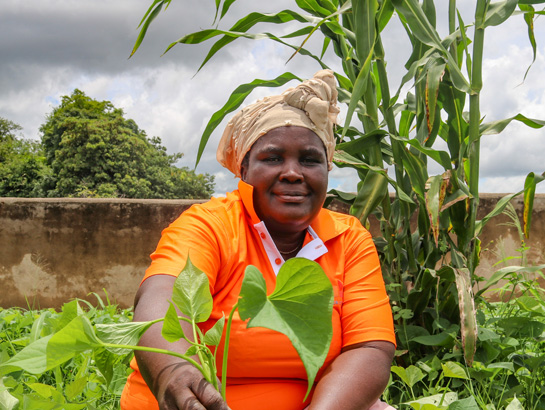Loice Matienga, a smallholder farmer and mother of seven from Mazowe, Zimbabwe, relied on farming to sustain her family. However, in recent years, she struggled to make ends meet. Paying for her children’s school fees, buying farming inputs, hiring a tractor, or expanding her farm felt impossible.
“I was at a crossroads, unsure how I would provide for my children and keep my farm running. I needed a breakthrough,” Loice shared.
That breakthrough came when she attended a vitamin A orange sweet potato District Vine Multiplication (DVM) workshop organized by HarvestPlus, with support from the Government of Canada, under the Expanding Nutrients in Food Systems project. In September 2024, Loice, along with agricultural extension officers and fellow farmers, received training on the nutritional benefits of vitamin A orange sweet potatoes, its vine multiplication, and the business potential of selling these vines.
Armed with the new knowledge gained, Loice invested USD $40 in 1,500 vitamin A orange sweet potato vines and started a nursery, using her sister’s borehole for irrigation. With hands-on guidance from Agritex extension officers, she followed the recommended best farming practices to ensure healthy vine growth.
“Loice has been an exemplary farmer, showing outstanding commitment to learning and applying her skills. She is setting a great example for others in her community,” said Prudence Hove, an Agritex Extension Officer.
As the season progressed, Loice’s business grew. With support from HarvestPlus in marketing her vines, she began selling them to local farmers. This new income source transformed Loice’s life. She paid one of her children’s school fees, hired a tractor to plow her fields, rented additional land, and purchased essential inputs such as fertilizer and seeds.
“The income from selling vines has truly changed my life. I can now provide for my family and invest in my farming business. This opportunity has given me hope,” she said.
Loice is committed to helping others in her community. She planted vines in a separate field to produce sweet potato tubers—both for her family’s nutrition and as an additional income stream. Her dream is to expand the vine nursery to reach more farmers and ensure more families benefit from this nutritious and profitable crop.
Loice’s journey is a powerful example of how agriculture, nutrition, and economic empowerment can work together to improve lives. With the right support and opportunities, smallholder farmers can achieve food security, escape poverty, and build a better future for their families and communities.
